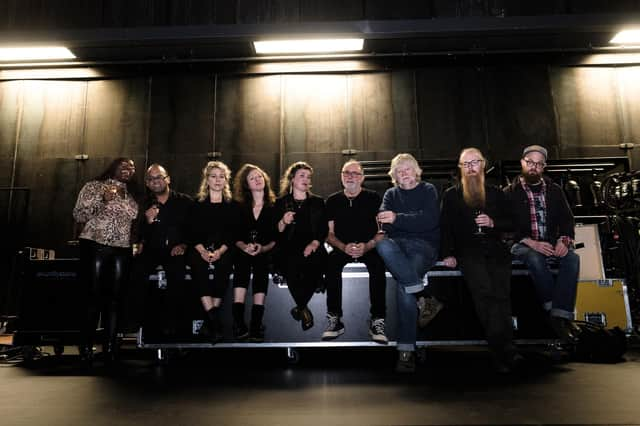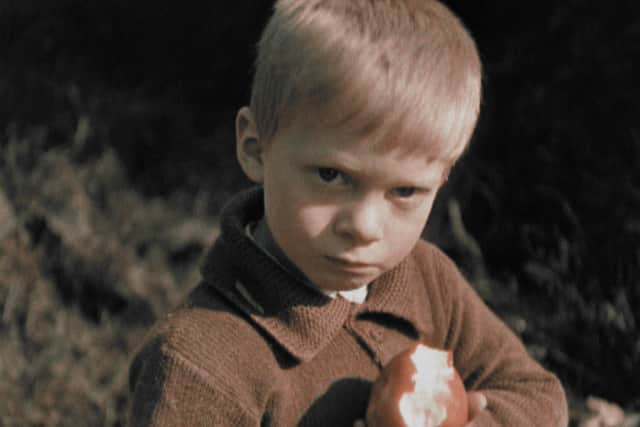Adrian Utley and Will Gregory on their soundtrack for the film Arcadia


Five years later, the pair have reconvened – with a band that includes singer Lisa Knapp – to accompany the film when it is screened in Leeds and London.
For Gregory, who has had a longstanding interest in silent film, the attraction to this project was Arcadia’s absence of a conventional narrative structure that left “a lot of space for extended pieces of music because there were blocks of archive (footage) that were themed together but didn’t have any narration or dialogue, so it as very much about the images and the music as a combination that was at the front of the whole experience”.
Advertisement
Hide AdAdvertisement
Hide Ad“As a composer, that’s a bit of a gift,” he says, “especially as with Adrian as well, you’re used to working to picture and given that very specific space in order to bloom, and to bring to the party what you do. Often it’s in competition with sound effects and dialogue and narration – all those other important things – but when it’s just music and image, to me that is the purest form of cinema.
“A lot of cineastes would also say that after the sound came in the art of cinema was irretrievably lost. There’s definitely an argument for that. Certainly directors that know about the power of image and music doing the whole job are some of the most visionary. Someone like (Sergio) Leone would’ve been inspired by silent films like Joan of Arc. A lot of great filmmakers were inspired by films from the silent era.”
The pair, who are both based in Bristol, viewed a rough cut of Wright’s film at the Watershed arts centre and realised “it was clear that music had an enormous role to play” in it. “Whenever you think that, you think ‘This is great, you’re not just a bit of angel dust or aural Photoshop, we’re actually a key part of what this is about’, so that was very attractive immediately.”
During the film’s gestation, the two composers found themselves in a dialogue with the director. Gregory explains: “Paul was grappling with some kind of way of stitching all this footage that he’d found together, so things were in very rough shape for quite a lot of the process. But that was good because that meant he was responding to what we were doing when we would send him music and he would try things out, not only where we thought they might go but in other places, and I think that’s always a good thing.
Advertisement
Hide AdAdvertisement
Hide Ad“Any sound and any image will have a relationship if you put them together because that’s the way the mind works – you could have somebody frowning and the sound of a car going past and you’re built to assimilate those two stimuli. For that reason, I think it’s legitimate for Paul to try music in places where it wasn’t specifically written because there will always be a connection but it might be unplanned or random. I really like that. I’m always excited when somebody moves a bit of music that you’d written for a scene somewhere else. He was very much playing around with what we were doing as well as us responding to the images.


“Obviously we knew what the mood was and there were key scenes where we knew that’s what we wanted to happen there, but there were other vague, impressionistic moments where it was much more of an open discussion.”
Utley and Gregory had previously worked together “loads” of times, including on a score for The Passion of St Joan, so they were familiar with each other’s working methods.
“With a project like this, you’re able to indulge yourself in some of your fantasies,” says Gregory. “With Adrian, on Joan of Arc, it was the idea of having a guitar quintet, a little orchestra of guitars. That was an experience of him learning how to use that as a resource, and that definitely comes into this film. We used quite a lot of minimalism in Joan of Arc, in terms of little processes that build up and gain momentum over a period of time, which was approriate for that film because there were some scenes which were nearly 20 minutes long and were just one, slow-moving mood.
Advertisement
Hide AdAdvertisement
Hide Ad“I think we know that sometimes we need to work apart and sometimes we need to work together. Arcadia was done over quite a long, extended period because we were doing it while Paul was editing it.”
Utley recognises Arcadia was “a different kind of project” to their previous collaborations. “There was a lot of film, as there is in a silent film, but this had some voiceovers so we weren’t completely floating around at sea with no other audio. There’s atmospheric sound and dialogue as well.
“I think whatever project we do together informs the next one, whatever it is we’re doing.”
The varied soundtrack, that juxtaposes snippets of folk music, electronica, classical and even glam rock, attempts to create its own narrative thread. “It goes from one distinctly different era to another, so it can start out with Elgar and then glam rock with the two little kids, it seemed to suit their trousers,” says Utley. “With Joan of Arc, we had an overall arc with what we wanted to say beforehand whereas with this we had a different palatte.”
Advertisement
Hide AdAdvertisement
Hide Ad“We just had to respond,” says Gregory. “We like using strings with voices and guitars and various synths, so we’ve already got a language of sounds that we can talk to each other with. If we said ‘This could do with a string arrangement’ we know what that means in terms of what it might sound like, so there is a kind of lingua franca there which is very valuable. It’s so difficult to talk about music in the abstract.”
“Also I guess there is a trust of each other,” says Utley. “We knew that there was some Elgar-esque, English cowpat music early on and I remember (Will) saying, ‘I could write a piece of music like that but why don’t we use what’s there?’ But I knew that Will could do that.”
When offers came in to perform the soundtrack live, however, the pair were initially reluctant to take them up. “It was something we were resistant to,” says Gregory. “We’d spent a year and a half dipping in and out of this project and people suggested immediately that we should perform it live because they thought it suited itself to that and I said ‘I don’t know if we want to do another year of Arcadia now, maybe kick that down the road’.
“But we’ve come to that road and we thought now is the time to do that. Somehow all the messages that are bound up with that archive are more and more relevant as every day goes by, so it felt this was a good moment to do that.”
Advertisement
Hide AdAdvertisement
Hide AdUtley says: “It’s funny how those things come around because we were going to work on a war film and I remember at the time when we were talking about it, a couple of years ago, everybody was saying ‘No-one wants to know about war, it’s not even relevant at the moment. I’m thinking now actually it is.
“Things come around in the end. A lot of the issues that are in (Arcadia) are incredibly in focus now.”
Wright’s film addresses the inequality within Britain through the prism of rural life over tha past century. It’s a theme that chimed with Utley and Gregory post-Brexit. “I don’t know how much musically, but we often get called to do Q&As with the film and end up talking about psychology and the philosophy and politics of all of this stuff, but actually we had no input,” says Utley. “We never had a discussion with Paul in a creative sense from his side of the thing, but we are observing this. “We could talk about inequality in the countryside forever and ever, and the disaparity between the rich and the poor.”
“And things haven’t really changed,” says Gregory. “In fact things have got quite a lot worse. I was talking to people about the use of the land after the Second World War because it was decided that all the little farms should join together to make big, efficient farming so that we could feed the rationing population but that meant all the hedgerows were cut down, all those little woodland areas were bulldozed. It’s made me more aware about what has happened to the land and how we’ve never recovered from that and so many other policies.
Advertisement
Hide AdAdvertisement
Hide Ad“In a way the early part of the film shows this Shangri-La of people playing in the hay and enjoying being part of the landscape but we’ve been separated from it further and further.”
“When I was a kid in the 70s, I remember going hay baling,” says Utley. “Although we weren’t wearing the same clothes as that idyllic life with the kids jumping around in the hay (in the film), my early life was not that dissimilar in the farm world, and then I went on to work on a farm as a teenager, beyond hay baling, before I went on to art school. It has changed in my lifetime, and I am in my 60s now so that is quite a few years since then, but it has changed very much. Jeremy Clarkson’s a farmer now, and the West London crowd have sold their houses for millions and moved into the countryside.
“That film Bait by Martin Jenkin (about tensions between locals and tourists in a Cornish fishing village) is a good example of what is happening to society now with money and moving the working class out their communities, even more than back in the time of the landed gentry when they used to supply them with housing a jobs. (Now) it’s ‘Get out of your house, I want it for a holiday home’. That seems to be what we’re looking at now.”
Arcadia Live is at Howard Assembly Room, Leeds on Friday March 3.
